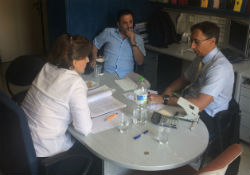WHO/Europe assists Greece in addressing informal payments in the health sector

WHO
The Ministry of Health of Greece is moving to formulate policies to reduce and eliminate informal payments in the health sector, as part of its overall efforts to increase financial protection of the population. These policies are being developed in view of the Greek government’s commitment to tackle corruption in the public sector, and in the context of the recently approved national plan against corruption.
To support the Ministry of Health, the WHO Project Office in Athens has engaged a team of international and local experts to provide assistance in evaluating and systematizing available data on informal payments, collecting additional data and developing a framework for understanding the drivers and policy options to reduce informal payments in the health sector.
A WHO consultant visited Greece on 17–23 July and participated in a series of meetings with key stakeholders, including health professionals, patients’ associations, academia and legal advisers. The consultant shared experience and good practices from other countries in the region, retrieved information on current frameworks and mechanisms, and discussed possible approaches to tackling the sensitive issue of informal payments in the Greek health sector. A draft report highlighting major findings and suggesting relevant and feasible policy recommendations is expected by early autumn. Following that the Ministry of Health, in collaboration with WHO/Europe, will initiate a consultative process with stakeholders to agree on the most feasible solutions and the way forward.
The initial assessment and the follow-up work are being done under the Strengthening Capacity for Universal Coverage (SCUC2) action.
Background
The SCUC action is carried out with funding from the European Union through a grant agreement between the European Commission and WHO/Europe. The general objective of the action is to contribute to improving health and health equity in Greece, especially among the most vulnerable in the crisis-stricken population, by helping the Greek authorities move towards universal coverage and strengthen the effectiveness, efficiency and resilience of their health system.



